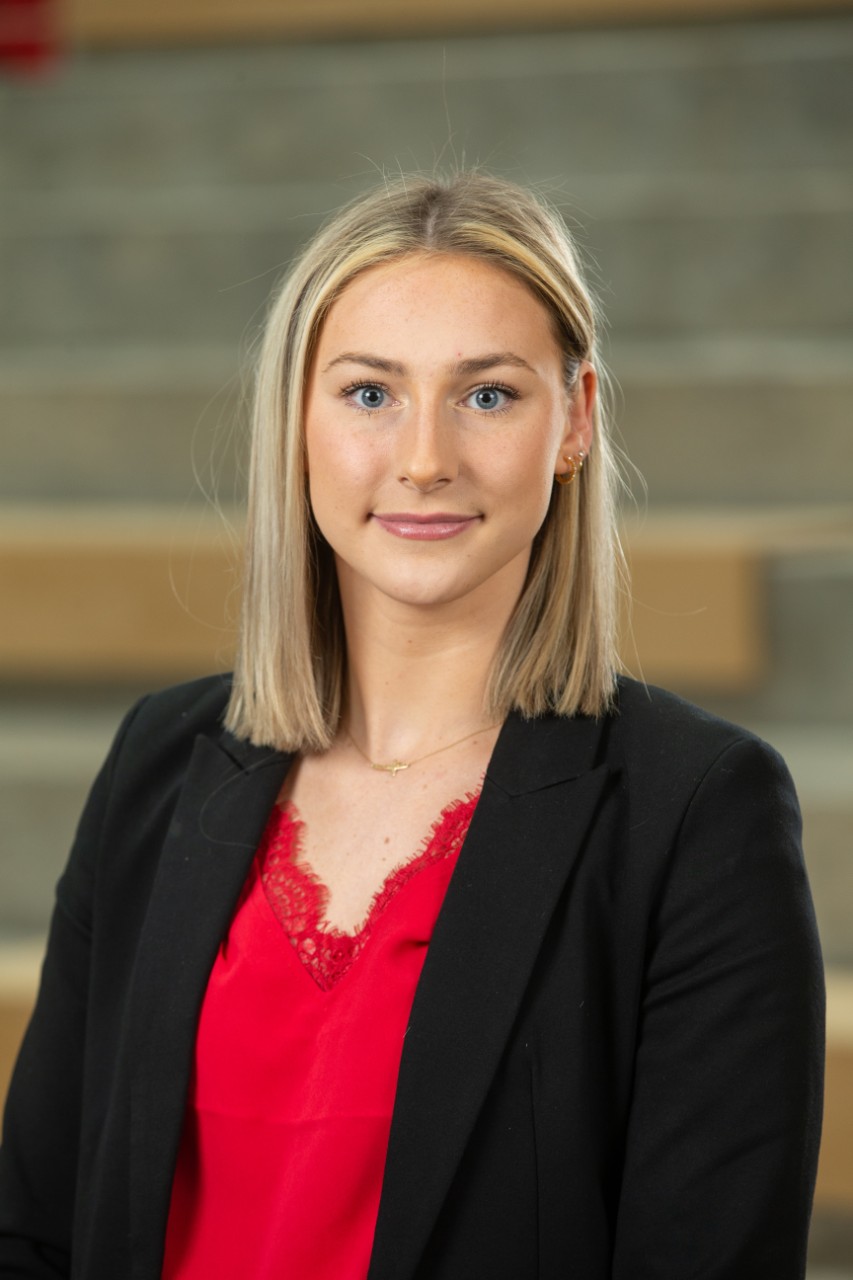Choose Your Own Adventure

From left: Calvin Catania, Kelly Frey, Miles Spearman and Mackenzie Pulte in the atrium of the Carl H. Lindner College of Business. All photos by Andrew Higley unless otherwise noted.
Current, former Lindner students reveal how UC’s nationally ranked co-op program set them up for immediate and future success
A creative working on major motion pictures. A marketing marvel consulting for a local Fortune 500 company. A recent graduate flying high with one of the world’s largest corporations. A finance whiz destined for the C-suite. Such are the wildly divergent, yet similarly impactful voyages in cooperative education experienced by former and current Carl H. Lindner College of Business students.
UC founded modern cooperative education over a hundred years ago, and ongoing Lindner innovations ensure that its experience-based professional development remains among the best in the country. U.S News and World Report’s 2021–22 rankings slotted UC fourth among the nation’s leaders in co-ops and internships, ahead of notable universities like Purdue, Ohio State, Michigan, Kentucky and Cornell.
Co-op is a powerful learning model, blending students’ academic education with hands-on professional experiences, enabling work with local, national and global employers of all sizes that directly correlates with their field(s) of study. In 2021, UC students garnered $58 million in annual co-op earnings. Over the 2021-22 academic year, Lindner students who were interning or on co-op full-time received an average salary of $10,800 per semester. And 90% of Lindner students who participated in a full- or part-time co-op secured a full-time job within three months of receiving their diplomas.

Clockwise from left: Frey, Spearman, Pulte and Catania at Lindner.
“By embedding paid, professional experiences within our academic programs, co-op helps Lindner students gain the skills, confidence and connections that accelerate their learning and their careers,” said Lindner dean Marianne Lewis, PhD. “Co-op is key to achieving our purpose at Lindner — empowering business problem solvers — as each experience helps our students learn more about the problems they seek to solve, the tools they are adept at using, and the careers and impact they wish to pursue.”
Lindner co-op nurtures symbiotic partnerships with employers seeking to hire the next generation of business problem solvers ready to thrive in a dynamic digital workplace. Lindner Career Services is an essential cog in these efforts, connecting students with staff, faculty, industry professionals and UC alumni to fuel their pursuit of a rewarding career. Career Services’ arsenal includes professional development courses and dedicated career coaches, ensuring that paid, supervised, major-oriented work is integral to the education of Lindner students.
“We challenge students to be scrappy, smart and savvy so that they impress both on paper and in person. We encourage them to take advantage of opportunities on campus to study abroad, to join a student organization and to build relationships with their professors,” said Lindner Career Services Director of Experiential Learning Keith Sun. “What’s so beautiful about discussing these possibilities alongside the importance of co-op with students is that all of it adds up to creating a more career-ready student, and a more career-ready student makes a greater professional impact and elevates the Bearcat brand, so employers know that Bearcats mean business.”
‘The coolest thing’
Testimony from current and former students reveals the pull of Lindner’s co-op program, a reminder that memorable actions speak louder than impressive statistics — though both are nice to tout.
Take Miles Spearman. Born in Philadelphia but raised in Youngstown, Ohio, Spearman arrived at UC in 2019 with an interest in media and music — and with the intention of being a biomedical engineer. After one semester, Spearman had a change of heart.

Spearman during his internship with NBCUniversal. Photo provided.
“I met a lot of friends in the College of Business and realized how robust their co-op program was. That’s what made me want to (transition into Lindner),” said Spearman, who is pursuing a double major in marketing and music, and a minor in media production. “I’m a musician, so I wanted to go into a field that was creative, but still have the support of career advisers and coaches.”
Kelly Frey, a native of the Cincinnati suburb of Anderson and a Senior Media Account Executive-Kroger Precision Marketing for 84.51°, began her college career at Ohio University as a journalism major. After a year, she decided to “switch gears.”
“I started thinking, ‘Where in Ohio could I go that has a really great business program?’ What caught my eye with UC was the co-op program,” said Frey, who graduated in 2018 with a marketing degree. “At the time, I had a friend at UC who was a freshman, and she was already in the process of applying to internships — and I thought that was the coolest thing.”
Mackenzie Pulte hails from Mt. Lookout, a neighborhood mere minutes east of UC’s Clifton campus. The finance major stated that the co-op program was “100 percent the deciding factor” in her decision to enroll at Lindner and UC. Pulte, who is also pursuing a business analytics minor, recalled a pre-college gathering where a UC alumnus summarized the impact of a leading co-op program.
“One of the alums said, ‘You go to New York, Chicago and San Francisco and apply to jobs against people from Stanford, Yale and Harvard,” Pulte said. “And nine times out of 10, you will get the job because you have those co-op experiences and real-life work experiences, and all they have on their resume is their GPA and the name of their school.’ That was really cool.”
Calvin Catania graduated in December 2021 with a double major in information systems and operations management. Originally from Cleveland, Catania wasn’t aware of the co-op program before visiting UC. He said potentially spending his collegiate years at Lindner became “pretty clear” after his visit and being educated on co-op. Catania is already appreciating the benefits of the program after joining GE Aviation’s Digital Technology Leadership Program post-graduation.
“When you have that much experience coming into your full-time job, it’s definitely a lot smoother,” Catania said.
Selecting your co-op journey
Students possess varying goals and aspirations in both seeking and choosing a co-op or internship experience. Some zero in on a company that aligns with their professional ambitions. Others select a business because the experience may augment their skill set and/or push them out of their comfort zone, potentially exposing them to a career track they had not previously considered. Knowing when and how to walk a particular co-op path can be tricky, and Sun noted that Career Services has learned to navigate this balance “delicately, but effectively.”
One of the alums said, ‘You go to New York, Chicago and San Francisco and apply to jobs against people from Stanford, Yale and Harvard. And nine times out of 10, you will get the job because you have those co-op experiences and real-life work experiences, and all they have on their resume is their GPA and the name of their school.’ That was really cool.
Mackenzie Pulte, BBA ’25
“We help students to develop greater self-awareness of their career goals and interests through their participation in co-op and teaching them to ask the right questions of their next potential employer,” Sun said.
Pulte is embracing experiences that align with her career goals. Her first co-op was in summer 2021 with two departments within Cincinnati Children’s Hospital: budget and financial analysis, and capital and treasury. On a commercial banking co-op with Fifth Third Bank since the start of spring semester, Pulte has appreciated the opportunity to “network throughout the bank.”
Catania — who interned with GE Aviation, Enerfab (where he also served as a consultant), AMEND and Legion Logistics — was looking for any opportunity that “fit in the curriculum” at the outset of his co-op voyage.
“After you have more and more experiences, (it) evolves to where you start pinpointing what the company offers you in terms of experience, mentorship, culture — you form a perspective on what to look for in a company,” Catania said.

Frey completed five internships during her time at Lindner, including a turn with The Hershey Company. Photo provided.
No stone was left unturned by Frey, who interned for companies across multiple industries: NaviStone, Cintas Corporation, The Devine Group, The Hershey Company and New York City-based marketing agency CBX.
“I had friends who did one or two co-ops throughout college, and they loved it and that worked for them,” Frey said. “For me, I still didn’t know what I wanted to do, so in my mind and with the help of UC, I was able to say, ‘OK, I want to do marketing, but marketing is such a broadly used term and so many things fall within it.’ I wanted to get my feet wet in different areas that marketing has to offer.”
Spearman already has work experience with HBO Max, Warner Bros., NBCUniversal, Cincinnati Symphony Orchestra and JPMorgan Chase under his belt. His philosophy is simple: How many figurative hats can he wear within an internship?
“Anything can be creative, so as long as I figure out what I want do and build those skills, by the time I graduate, I’ll have those skills so I can be competitive in anything full time,” Spearman said.
Keeping pace with an evolving workplace
Despite the prestigious rankings, compliments from current and former students as well as the breadth of local, national and international companies linked to Lindner, there’s no time for the college to rest on its co-op laurels. Convincing potential students of the value of a university education has grown more difficult over the past half-decade. In turn, Career Services must constantly stay abreast of the evolving needs of the next generation.
“With changes happening on a greater societal level, both students and employers are navigating new expectations for remote work, equity and inclusion, compensation and benefits and professional development,” Sun said. “Our increasingly important role in Career Services continues to be to advance our students’ success in determining career direction, gaining beneficial and relevant experience in the workplace, expanding their network of industry professionals and companies and presenting their interests effectively and ethically in the working world.”
Lindner’s modern learning model and vast resources are a powerful ally for future business problem solvers, with cooperative education slated to only increase in importance in the future. The possibilities are plentiful, wide-ranging, and, yes, endless.
“We consistently innovate on how we teach our students, coach them and connect them to regional and national employers. Our team is growing to provide more personalized resources for each business student. We’re increasing our technology capabilities for employer relations,” Sun said. “And we’re raising the quality of experiential learning in changes to the co-op program.”

Catania, Frey, Spearman and Pulte doing the "Down the Drive" cheer.

